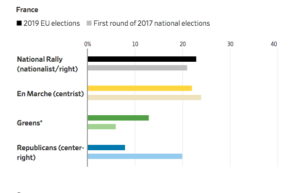European Elections Deepen Divisions in National Capitals
Laurence and Stephen Fidler, Wall Street Journal, May 27, 2019
The outcome of the weekend’s European Union elections threatened a fresh stage of political instability in the bloc, with results in many countries signaling disillusion with the establishment and polarization among voters.
Britons delivered stunning blows to the U.K.’s two main political parties, coalition governments in Italy and Germany faced deepening strains and other countries called early elections.
As final results trickled in Monday, there was relief in the EU’s capital, Brussels, that the vote didn’t yield a broad anti-EU nationalist surge. Green parties performed particularly strongly and pro-European lawmakers are set to form a clear majority in the new European Parliament, which sits on July 2. Turnout was bigger than expected at 50.82%, a 20-year high.
{snip}
The European Parliament has a say in choosing the bloc’s top figures, but the main parties in the newly fragmented 751-seat legislature may find it hard to coalesce behind candidates. That could allow national leaders to impose their choices.
“The electorate is crying out for change and is therefore volatile — preferring to back new insurgents rather than the status quo parties that have been around for decades,” said Mark Leonard, founding director of the European Council on Foreign Relations.
Austria was already headed for the polls after Chancellor Sebastian Kurz on May 18 dissolved his coalition. On Monday, Mr. Kurz was toppled by a no-confidence vote in Parliament, despite his party’s strong performance in the EU elections. On Sunday, Greek Prime Minister Alexis Tsipras, whose Syriza party was firmly defeated in the EU vote, called snap elections before summer.
No country captured the growing polarization better than Britain, which chose almost three years ago to exit from the EU. {snip}
The ruling Conservative Party was relegated to fifth place with less than 10% of the vote, its worst showing in a nationwide poll in its history. The main opposition Labour Party fell into third place, with less than 15%.
The big beneficiaries were the upstart Brexit Party, led by longtime anti-EU campaigner Nigel Farage, which gathered more than 31%, and the anti-Brexit Liberal Democrats, which polled more than 20%. There was also a strong showing for the pro-EU Greens, with 12%.
In Germany, the election was also a blistering indictment of the two ruling parties. Chancellor Angela Merkel’s center-right Christian Democratic Union and her left-leaning coalition partner, the Social Democratic Party, both suffered large drops in votes compared with the last European elections in 2014 and Germany’s federal election of 2017.
The main winner from this erosion was Germany’s centrist Greens and not the stridently nationalist Alternative for Germany, whose share of the vote fell almost 2 percentage points below its showing in 2017’s national vote.
{snip}
In France, the vote also further decimated traditional center-left and center-right parties. That suggested that pro-EU centrist President Emmanuel Macron continues to face a formidable political challenge from his top 2017 presidential opponent, Marine Le Pen, whose anti-migrant, euroskeptic National Rally eked out first place on Sunday. France’s Greens surged into third place.
{snip}

With the leaders of Germany and France weakened and Britain on the sidelines, haggling over the EU leadership positions could be tortuous. {snip}
The Parliament, directly elected since 1979, remains the weakest of the EU’s major institutions though it has steadily accrued powers. It has a major say on passage of laws regulating critical areas such as trade, security, the internet and the bloc’s budget. It also has a role approving EU environmental rules, which will be a focus of the bloc’s strengthened Green movement.
{snip}
Looming political wrangling could be further complicated by nationalist leaders in Hungary, Poland and Italy who emerged strengthened in last week’s elections. They want to win back powers from Brussels and limit the EU’s say over their policies.
In Italy, the elections handed a resounding victory to the nationalist League that reversed a balance of power from last year’s national elections with its coalition partner, the antiestablishment 5 Star Movement.
During campaigning, League leader Matteo Salvini, who is Italy’s interior minister, and members of his party clashed frequently with their 5 Star allies.
Mr. Salvini on Monday discounted, for now, speculation that his strong showing could tempt him to trigger a government crisis leading to fresh national elections.
{snip}
Observers say the results will likely help Mr. Salvini dominate the government.
“It will be Salvini who will dictate even more the agenda of the government at national and European level,” said Lorenzo Pregliasco, managing partner of Turin-based political consulting firm Quorum.
{snip}















